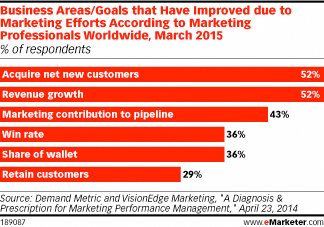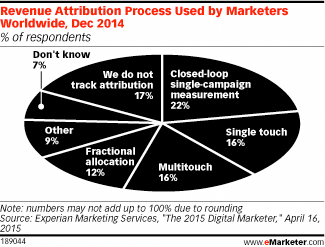Are Marketers Measuring Their Business Value?
May 9, 2015
![]() More than ever, marketers are under pressure to demonstrate their business value. In a March 2015 study by Demand Metric and VisionEdge Marketing, 83% of marketing professionals worldwide said the pressure to prove their business contribution had increased.
More than ever, marketers are under pressure to demonstrate their business value. In a March 2015 study by Demand Metric and VisionEdge Marketing, 83% of marketing professionals worldwide said the pressure to prove their business contribution had increased.

Marketers reported having an effect across a wide range of business areas and goals—though no category garnered an overwhelming percentage of respondents. Customer acquisition and revenue growth were the most popular answers, each cited by just over half of respondents. Around four in 10 said they had improved their pipeline contribution, while about one-third cited win rate and share of wallet. Fewer than three in 10 said marketing efforts had helped with customer retention.
In order to drive results and contribute to the overall business, marketers need accurate attribution. Otherwise, how will they know what actually works? However, December 2014 polling by Experian Marketing Services found that marketers were still using limited models to attribute sales—if they were doing so at all.
Closed-loop single-campaign measurement was the most common revenue attribution process used by marketers worldwide, and 17% didn’t track attribution at all—the second-highest response. In all, nearly nine in 10 respondents said they had revenue attribution issues. Struggles ranged from problems integrating data and a lack of resources to obtaining consistent performance metrics and understanding which channel combinations yielded the most efficient paths to response.
 A lack of data integration and performance measurement could prevent marketers from maximizing their business impact. According to research released by Teradata in January 2015, 57% of marketing and communications executives worldwide cited better business results as a benefit of using data when making decisions.
A lack of data integration and performance measurement could prevent marketers from maximizing their business impact. According to research released by Teradata in January 2015, 57% of marketing and communications executives worldwide cited better business results as a benefit of using data when making decisions.
Courtesy of eMarketer





























